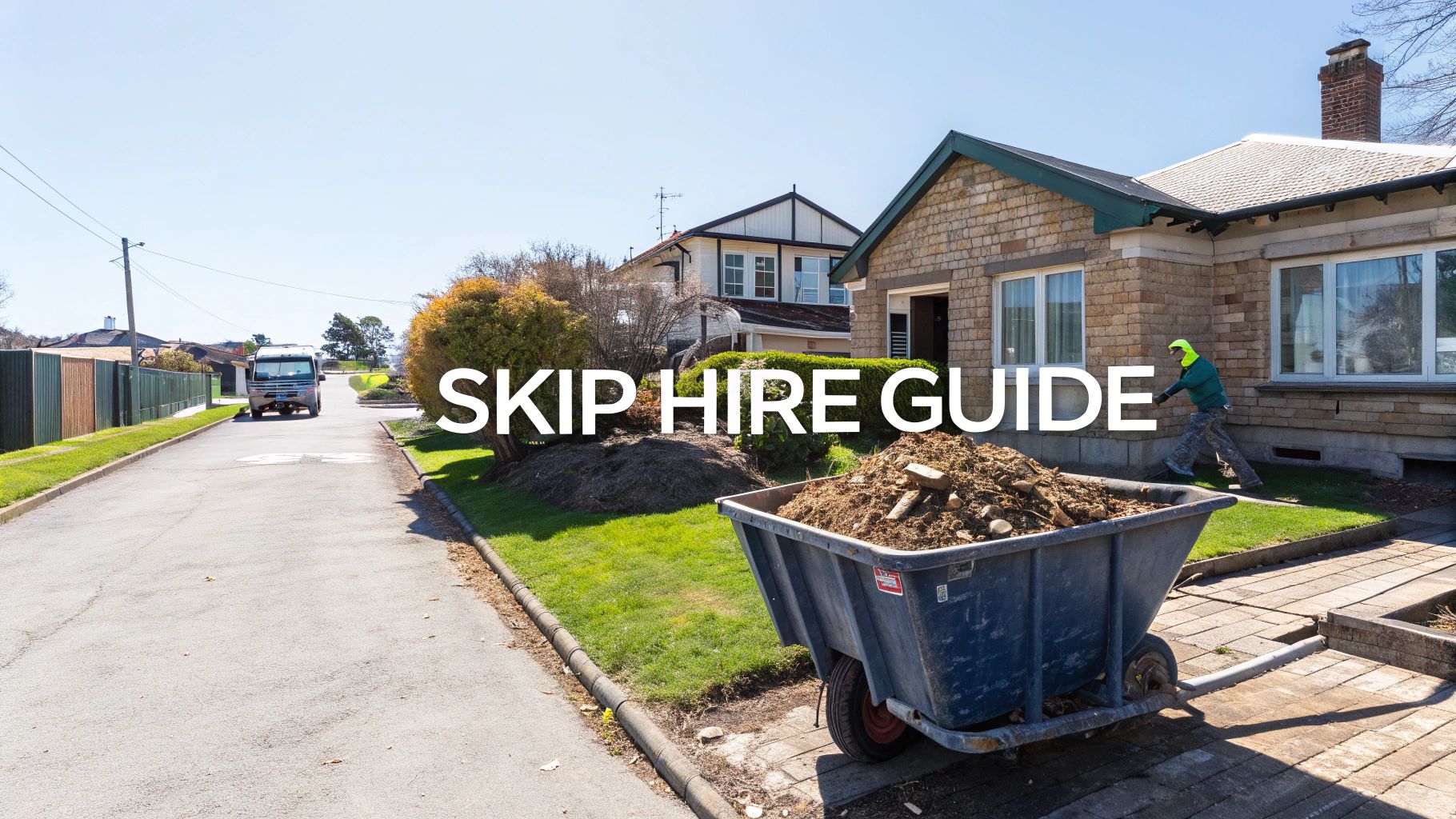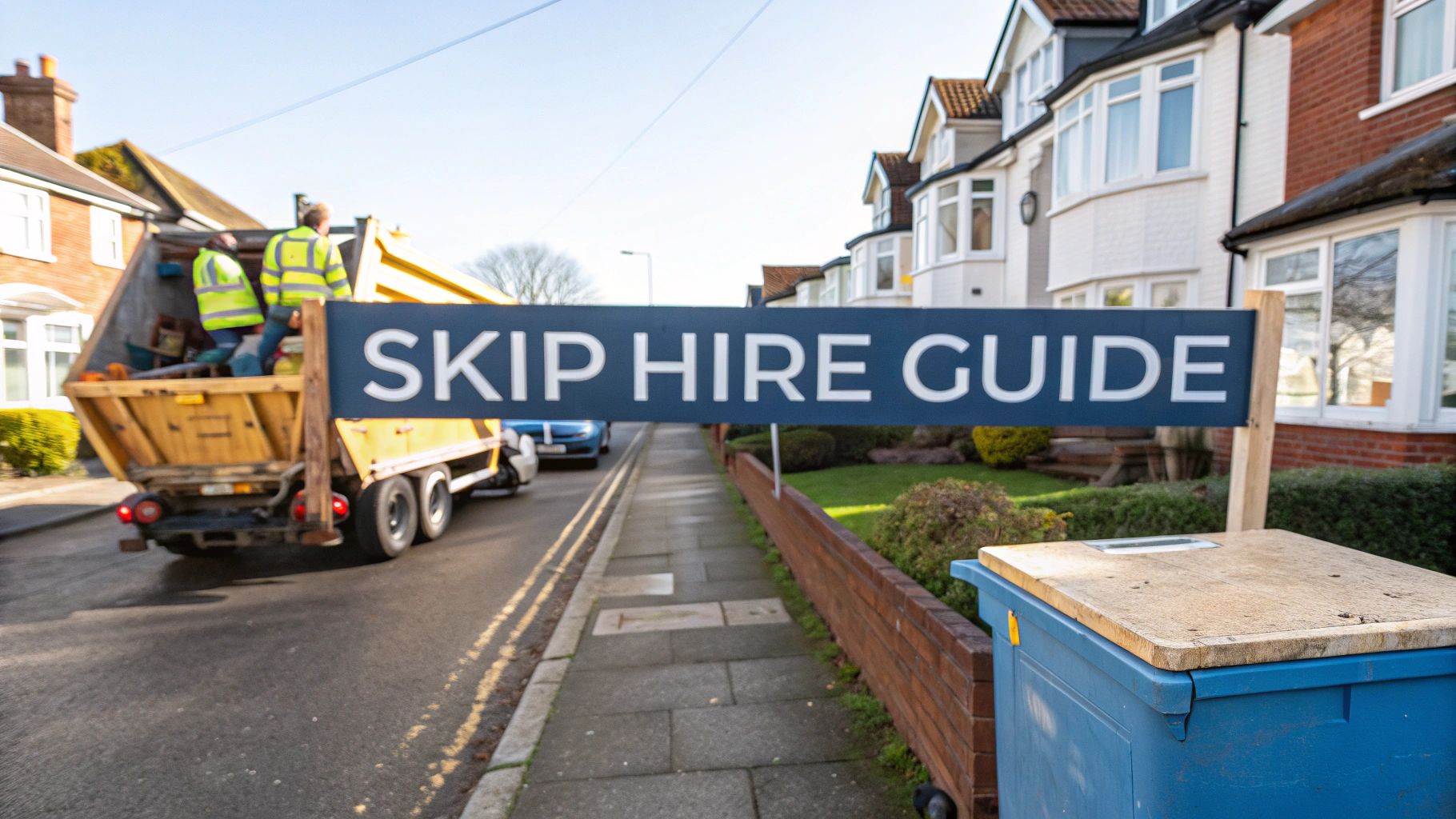Find the Cheapest Skip Hire Near Me – Best Deals Inside!
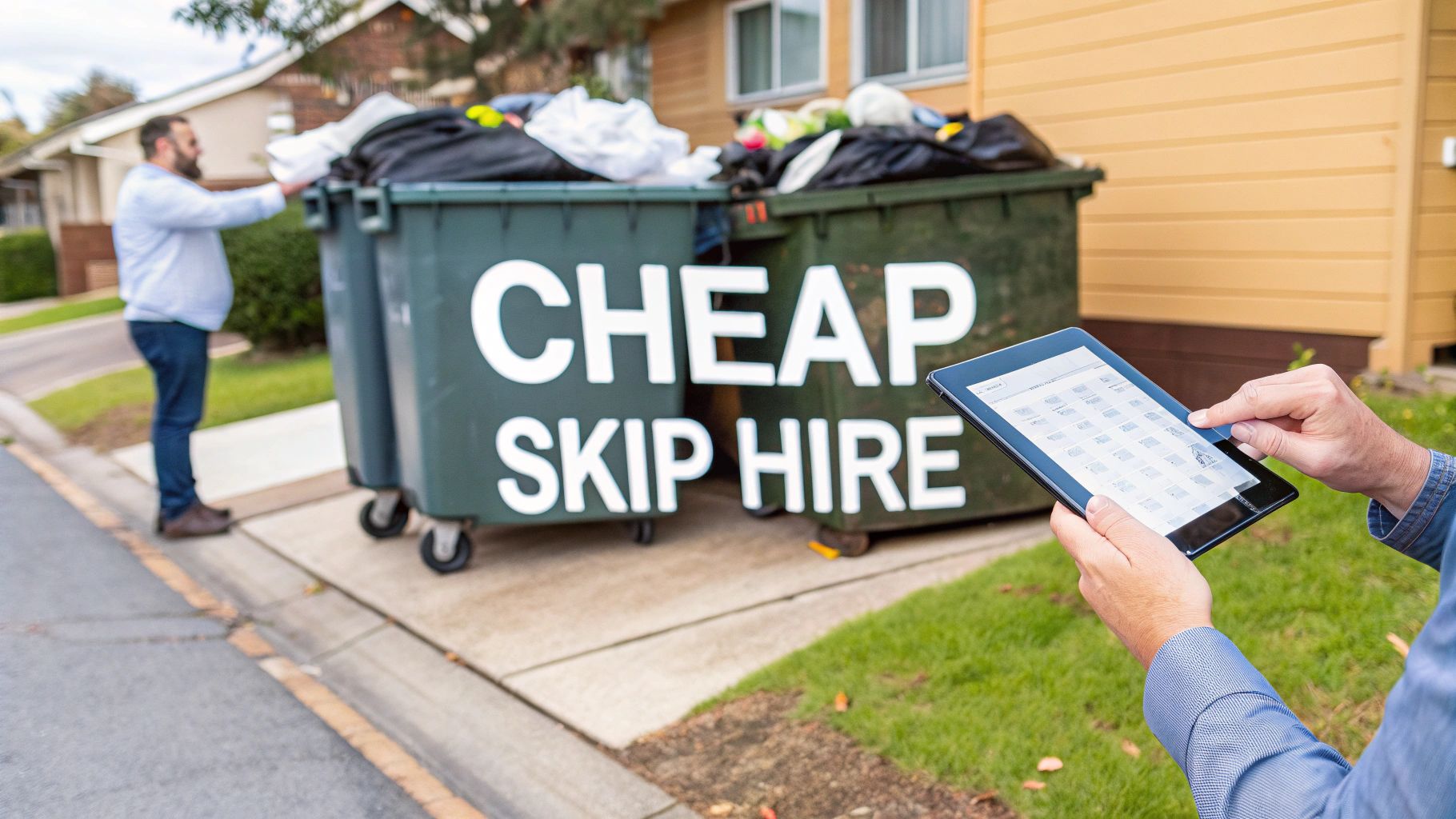
Find the Cheapest Skip Hire Near Me – Best Deals Inside!
When you’re searching for the cheapest skip hire near me, it’s easy to focus on that initial quote. But that’s just one piece of the puzzle. The true cost of hiring a skip is often shaped by less obvious things like landfill taxes, fuel surcharges, and maybe even permit fees. These can all bump up the final bill, so understanding them from the get-go is the key to finding a genuinely good deal.
Decoding the True Cost of Skip Hire
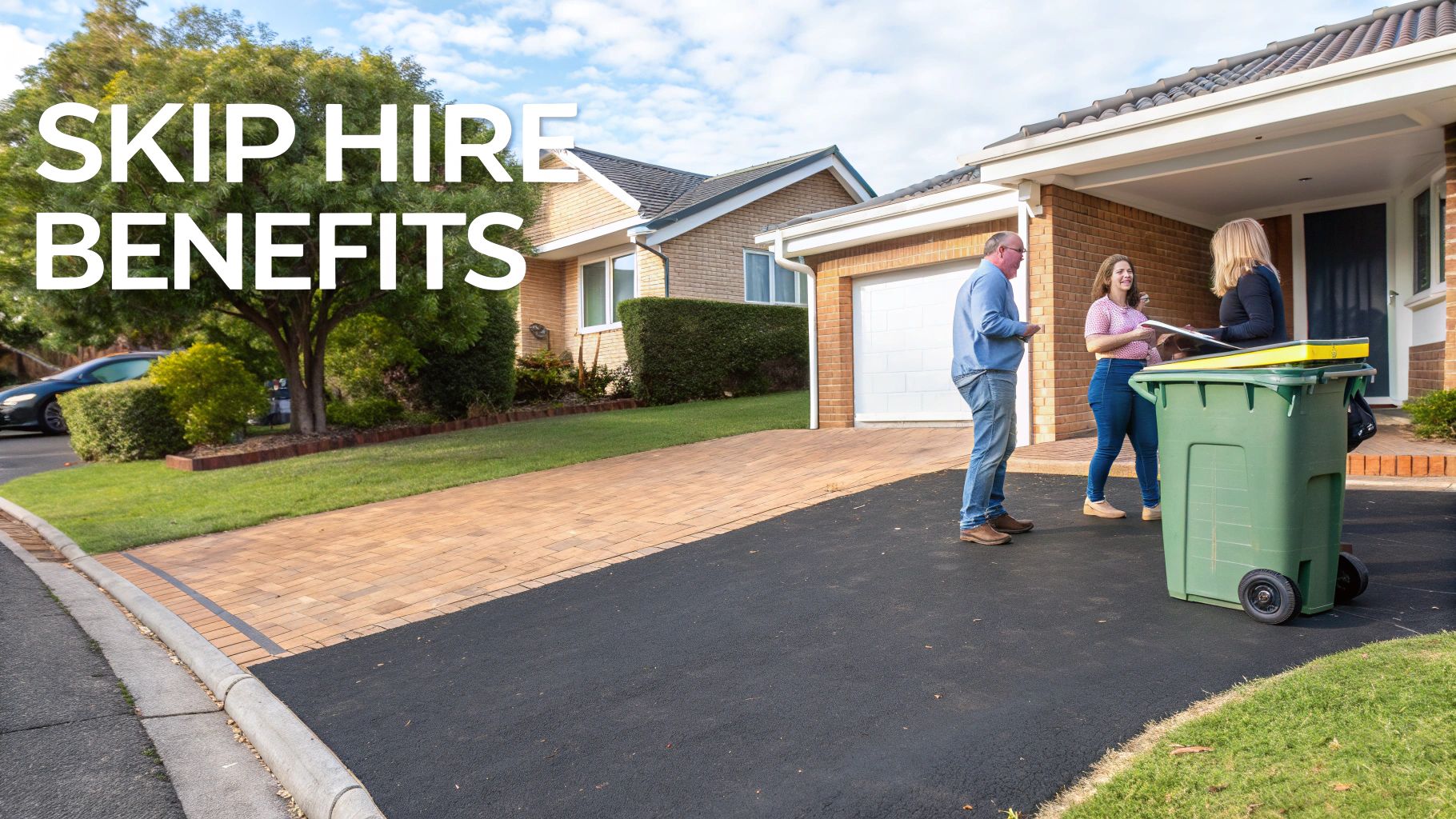
Finding a genuinely cheap skip means you have to look beyond that headline price. The figure you’re quoted is actually a pretty complex calculation, influenced by all sorts of operational and economic factors. You’re not just paying for a big metal box; you’re paying for a full service that includes delivery, collection, sorting the waste, and disposing of it responsibly.
It often surprises people just how much outside market forces can affect their local skip hire bill. Between 2022 and 2025, for instance, the cost of raw materials needed to make skips—especially steel—shot up by 31%. That sort of supply chain instability accounts for around 34% of the total price fluctuations we see in skip hire. Then there’s fuel; swings in diesel prices can make collection charges vary by 12-23% from one quarter to the next.
Key Factors That Drive Skip Prices
To compare quotes like for like, you need to know what makes up the total price. These are the often-unseen costs where the real value is determined.
- Landfill Taxes: This is a government tax on any waste that ends up in a landfill, and it goes up every year. Reputable companies will always factor this into their pricing. If you see a quote that seems unusually cheap, it might be a red flag that they’re cutting corners and disposing of waste improperly to dodge this tax.
- Permit Fees: If your skip has to go on public land, like the road outside your house, you’ll need a permit from the council. The cost varies depending on your local authority, but the skip company can usually sort this out for you for an extra fee.
- Waste Type: What you’re throwing away really matters. Heavy waste like soil and hardcore is more expensive to transport and process than lighter mixed waste. Certain items, like plasterboard, also come with extra charges because they need to be handled separately.
A price that seems too good to be true usually is. It could be a sign of a company scrimping on essential things like insurance, licensing, or their environmental responsibilities, which could leave you liable if something goes wrong.
Budgeting for Waste Disposal in Larger Projects
This detailed cost structure isn’t unique to skip hire. When you’re trying to figure out the cost of any big home improvement project, like building a new garden wall, remember that waste disposal is a major line item. Getting your head around the true cost of a retaining wall project means factoring in everything from materials and labour right down to the final site clearance.
By looking at skip hire as a complete service rather than just a product, you’ll be in a much better position to assess quotes. This knowledge lets you ask the right questions and find a company that offers genuine, compliant value, making sure your project runs smoothly without any nasty financial surprises.
Finding Genuine Bargains on Local Skip Hire

Now that you have a solid grasp of what goes into skip hire pricing, you can start your search for the best deal with a bit more confidence. The aim isn’t just to find the cheapest price, but to find a price that reflects genuine value. That means looking beyond a quick online search and using a few smart tactics to find the best local companies.
Your first thought might be to use an online comparison site. These can be handy for a quick overview of who’s out there, but they rarely paint the full picture. Many are simply lead generators that pass your details along, sometimes adding their own commission on top of the price you pay.
A much better approach is to use these sites for a spot of initial research, and then go directly to the source.
Go Direct to Local Companies
Once you’ve got a shortlist of local providers, pick up the phone. You’ll often find that speaking directly to independent, local companies unlocks better prices and more flexible service. They simply don’t have the same overheads as the big national chains and have a local reputation to protect. This direct conversation is your best chance at getting a truly transparent quote.
When you call, make sure you’re armed with the right questions to avoid any nasty surprises later on.
- Is VAT included in the price you’ve quoted me?
- What’s the standard hire period, and what are the extra charges if I need it for longer?
- Does your quote include delivery, collection, and all the disposal fees?
- If I need a permit, will you sort that out, and is the cost included?
Getting straight answers to these questions helps you build a true picture of the final cost. You can learn more about how different factors influence the final bill by exploring detailed guides on current skip hire prices near you.
The cheapest quote is no bargain at all if the skip turns up late or, even worse, doesn’t turn up at all. A company’s reliability is every bit as important as its price. A dependable service saves you from costly project delays and the headache of chasing up a collection.
Judging Reliability Beyond the Price Tag
A low price is meaningless without good service to back it up. Before you commit, spend a few minutes checking out the company’s reputation online. Look for recent reviews on platforms like Google or Trustpilot. Don’t just glance at the star rating; dive into what customers are actually saying.
Keep an eye out for patterns in the feedback. Are customers consistently praising the company for things like:
- Punctual delivery and collection? This is absolutely vital for keeping your project on track.
- Clear communication? Were customers kept in the loop about timings?
- Helpful drivers? Was the driver considerate when placing the skip on their property?
A couple of negative reviews are normal for any business, but a consistent theme of late deliveries, hidden charges, or poor communication is a massive red flag. By combining direct quotes with a bit of solid research into a company’s reliability, you put yourself in the best possible position to find a genuinely great deal.
Choosing the Right Skip Size to Avoid Wasted Money
One of the quickest ways to overspend on waste removal is picking the wrong skip size. It’s a classic mistake. If you order one that’s too big, you’re literally paying for fresh air. On the other hand, underestimating your rubbish could mean you’re faced with the surprise expense and headache of hiring a second skip just to finish the job.
Getting this right is crucial for anyone searching for the “cheapest skip hire near me,” because the best price is meaningless if it’s for the wrong product. Think of it like a removal van; you wouldn’t hire a massive lorry to move the contents of a studio flat. The same logic applies here. You need to match the container to the job at hand.
Visualising Your Waste Volume
The trickiest part for most people is picturing how much rubbish they actually have. Skip sizes are measured in cubic yards, which isn’t a unit many of us use day-to-day. A simple way to get a good estimate is to think in terms of standard black bin bags.
For example, a small domestic project like clearing out a garden shed or a single room might only generate 20-30 bin bags of waste. In this scenario, a 2-yard ‘mini skip’ is perfect. But a full kitchen renovation, complete with old units, tiles, and flooring, could easily fill an 8-yard ‘builders skip’, which holds around 70-80 bin bags.
The goal is to hire a skip that you can fill comfortably without being tempted to overfill it. Overloading a skip past its marked ‘level load’ line is illegal for drivers to transport, which can lead to wasted journey fees and the unpleasant task of having to unload the excess yourself.
This chart shows just how much the cost can jump between sizes, highlighting why an accurate choice is so important for your budget.
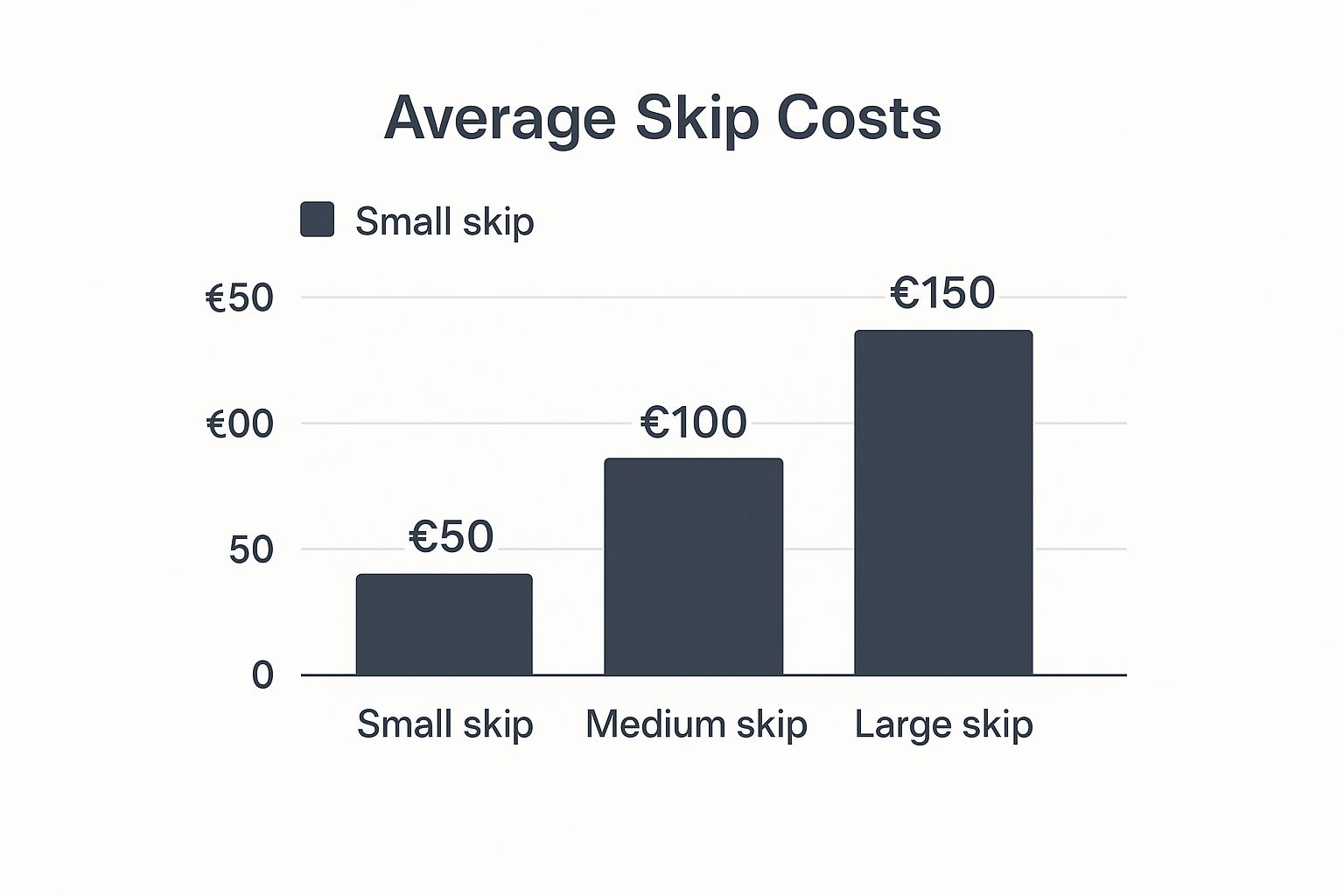
As you can see, jumping up a size category can significantly increase your costs, reinforcing the need to estimate your waste volume as accurately as possible before you book.
A Quick Guide to Common Skip Sizes
Matching your project to the right skip is straightforward once you know what you’re looking for. To make things a bit clearer, I’ve put together a simple table outlining the most common sizes and what they’re typically used for.
Common UK Skip Sizes and Typical Uses
| Skip Size (Cubic Yards) | Approx. Bin Bags | Ideal For |
|---|---|---|
| 2-4 Yard (Mini/Midi) | 20 – 40 | Small garden clearances, single room declutters, minor DIY jobs. |
| 6-8 Yard (Builder’s) | 60 – 80 | Kitchen/bathroom refits, major renovations, general construction & household waste. |
| 10-12 Yard (Maxi) | 100 – 120 | Large house clearances, bulky but light items like furniture and shop fittings. |
This quick-glance table should help you narrow down your options, but here are a few more pointers:
- 2-4 Yard Skips (Mini/Midi): These are the go-to for small-scale garden clearances, minor DIY jobs, or decluttering a single room. Their compact size makes them perfect for properties with limited access, like a small driveway.
- 6-8 Yard Skips (Builders Skips): This is the most popular choice for general construction waste and larger home renovations, such as a bathroom or kitchen refit. Most companies allow heavy waste like soil and rubble in an 8-yard skip.
- 10-12 Yard Skips (Maxi Skips): Suited for bulky but lightweight items from large house clearances or shop fit-outs. Take note that these larger skips often cannot be used for heavy waste like soil due to weight restrictions on the lorries.
For a more detailed breakdown of dimensions and capacities, you can find in-depth information by reviewing this helpful guide on how skip sizes are explained. Taking five minutes to understand these options ensures you make an informed decision and don’t waste a penny.
How Green Regulations Affect Your Search for a Cheap Skip

The world of waste management has changed massively in recent years, and it’s had a real knock-on effect on what you pay. When you’re searching for the cheapest skip hire near me, it’s easy to think the price is just for the big metal box itself. The reality is, a huge chunk of that cost is now driven by strict environmental rules that every responsible company has to follow.
These aren’t just bits of bureaucratic red tape; they’re fundamental to how modern waste is handled. They directly pump up a company’s running costs, and that, in turn, shapes the quotes you receive.
The Ever-Increasing Cost of Landfill
One of the biggest financial headaches for the industry comes straight from government taxes. The UK skip hire sector is currently grappling with some major cost hikes, and a lot of it boils down to these green regulations.
The main culprit? Landfill tax. As of April 2025, this tax has rocketed to £126.15 per tonne. To put that in perspective, it was just £91.35 per tonne back in 2019. That’s a serious jump.
This tax is there to stop us from just burying all our rubbish, but for skip companies, it’s a massive, unavoidable operating cost. You can read more about how these waste regulations are creating struggles for skip hire firms. This financial squeeze is exactly why a quote that seems too good to be true probably is.
An extremely cheap quote should set alarm bells ringing. It often means the company is cutting corners and dodging legal disposal routes to avoid those hefty landfill taxes. This could even involve illegal fly-tipping. If that waste is traced back to you, you’re the one who could be facing a massive fine.
The New Rules for Sorting Your Waste
It isn’t just taxes making things more complex. New regulations now insist that waste is carefully separated into at least five different streams before it can be processed.
This means pulling apart materials like:
- Organic matter
- General recyclables (paper, card, plastic)
- Hazardous materials
- Textiles
- Residual, non-recyclable waste
For a skip hire company, this means shelling out for proper sorting facilities, specialised machinery, and trained staff to manually sift through the contents of every single skip. It’s a labour-intensive job that’s crucial for staying compliant, but it adds another layer of cost to the service. A company that invests in doing this right is protecting both the planet and its customers.
Choosing a provider that follows these green rules isn’t just about being eco-conscious; it’s about protecting yourself. Reputable firms factor these compliance costs into their pricing. It might mean the upfront cost is a little higher, but it gives you peace of mind that your waste is being handled legally and responsibly. That’s the real meaning of value in today’s market.
Smart Ways to Reduce Your Final Skip Hire Bill

Getting a great initial price is a fantastic start, but the real savings often come from how you manage the skip once it’s on your property. It’s the small, smart actions that can make a surprisingly big difference to your final bill, ensuring you get maximum value and avoid any unexpected penalties.
The most effective strategy is to think like a waste management professional. This really just means sorting your rubbish before it even goes into the skip. By separating different types of waste, you can often unlock better rates from the hire company.
The Power of Pre-Sorting Your Waste
Most people just throw everything into the skip together, but this mixed waste is far more labour-intensive for the company to process down the line. If you can present them with a skip containing just one type of material, their costs go down—and a good company will sometimes pass those savings on to you.
Before you start loading, think about creating separate piles for specific waste streams:
- Clean Hardcore: This is your bricks, concrete, and rubble.
- Soil and Stone: Often accepted as a single waste type.
- Green Waste: Garden clippings, branches, and other organic matter.
- Wood: Any untreated timber or old wooden furniture.
When waste is segregated, companies can recycle up to 70% of collected materials. This dramatically reduces what they send to landfill and helps them mitigate the hefty £126.15 per tonne landfill tax.
Skips containing only soil or green waste may even qualify for a discounted rate. It’s a simple tactic that directly cuts your costs. To get a better feel for how these factors influence the numbers, have a look at our breakdown of local skip hire prices.
Load Your Skip Like a Pro to Maximise Space
How you fill the skip is just as important as what you put in it. A poorly loaded skip is just wasted space you’ve paid for, and it seriously increases the risk of overfilling—which always comes with hefty penalties.
Start by placing large, flat items like old doors or panels along the bottom and sides to create a level base. Then, break down anything bulky. Smash up that old furniture and flatten any boxes to get rid of empty air pockets. As you go, fill the gaps with smaller debris, making sure you use every last inch of space efficiently.
Pro Tip: Never, ever fill your skip above the marked ‘level load’ line. Drivers are legally prohibited from transporting overloaded skips. You’ll likely face a ‘wasted journey’ fee and be forced to remove all the excess waste yourself. This one mistake can instantly wipe out any savings you made on the initial quote.
Ultimately, keeping project costs down involves more than just waste. To keep your entire project on track, it’s worth exploring broader smart strategies for reducing construction costs for valuable insights. These simple, practical steps put you in control, turning a standard hire into the cheapest skip hire possible.
Common Questions About Affordable Skip Hire
Hiring a skip, especially if it’s your first time, can feel a bit daunting. You’re trying to track down the best price, but you’re also suddenly dealing with permits, weight limits, and waste rules. To help you feel more confident, we’ve put together clear, straightforward answers to the most common questions people have when looking for affordable skip hire.
Getting these details right from the start is the key to making sure your project runs smoothly and your budget stays intact. A simple misunderstanding about what’s allowed in a skip or where you can put it can quickly lead to unexpected costs and frustrating delays.
Do I Really Need a Permit for My Skip?
This is one of the most frequent questions we get, and thankfully, the answer is simple: it all depends on where the skip is going to live. If you can fit the skip entirely on your private property—like a driveway or garden—then no permit is needed. This is by far the easiest and cheapest route.
However, if any part of the skip needs to sit on public land, like a road, pavement, or grass verge, you absolutely must have a permit from your local council. Your skip hire company should sort this out for you, but it’s always wise to double-check. Permit costs vary between councils but typically fall in the £30-£60 range. Make sure this is included in your quote to avoid a nasty surprise on the final bill.
What Happens If I Overfill the Skip?
It’s always tempting to squeeze in that last little bit of rubbish, but trust us, overfilling a skip is a serious mistake. Every skip has a ‘level load’ line clearly marked on its side. Filling it beyond this point isn’t just against the company’s policy—it’s illegal for the driver to transport it.
An overloaded skip is a genuine safety hazard on the road. The collection driver will refuse to take it until you’ve removed all the excess waste. This can be a real headache, and many companies will charge a ‘wasted journey fee’ for their time and fuel. This single error could easily wipe out any savings you made finding the cheapest skip hire in the first place.
A level load isn’t just a suggestion; it’s a legal requirement. Drivers face hefty fines and points on their licence for transporting unsafe loads, so they simply won’t take the risk. Always load responsibly to ensure a smooth, penalty-free collection.
What Can I Absolutely Not Put in a Skip?
Understanding what’s prohibited is crucial for avoiding fines and hassle. Thanks to strict environmental and safety regulations, certain hazardous materials are banned from general waste skips. These items need specialist disposal and can cause serious contamination if they get mixed in with everything else.
While each provider may have a slightly different list, the following items are almost universally forbidden:
- Asbestos: This is highly dangerous and requires specialist removal services.
- Plasterboard: Cannot be mixed with other waste due to its chemical composition.
- Electricals: Items like fridges, TVs, and monitors (known as WEEE waste).
- Tyres and Batteries: These contain harmful chemicals that can leak.
- Liquids: This includes paint, oil, and solvents.
- Gas Canisters: These pose a serious explosion risk.
Always ask your chosen company for their specific list of prohibited items before you start filling the skip. Getting it wrong can lead to your skip being returned at your expense or significant extra charges for its safe disposal.
For hassle-free, compliant, and affordable waste management solutions in Dorset, trust the experts at The Waste Group. Find the perfect skip for your project and book online today!
